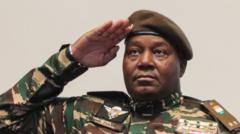Niger's military rulers have officially transitioned into a new era, as General Abdourahamane Tchiani has been sworn in as the country's president for a proposed five-year period of military governance. The new charter replacing the constitution was signed during a ceremony held in the capital, Niamey. This shift comes two years after Tchiani led a coup that ousted the democratically elected President Mohamed Bazoum.
In his acceptance speech, General Tchiani expressed humble gratitude for his new military rank and presidential duties, pledging to honor the trust placed in him. This extended transition is considered flexible by the junta, dependent on Niger's ongoing security concerns, which have been exacerbated by jihadist attacks in the region. The situation in Niger mirrors political unrest seen in neighboring countries such as Mali, Guinea, and Burkina Faso, where juntas have seized power and fostered new alliances, notably distancing themselves from France while engaging with Russia.
The military's takeover drew tensions with the Economic Community of West African States (ECOWAS), particularly after the junta proposed a three-year timeline for transitioning back to democracy, an offer that was initially met with threats of force by ECOWAS before de-escalating. Meanwhile, the junta is presently prosecuting former President Bazoum on charges of high treason while he remains detained at the presidential palace along with his family.
Tchiani stated that the new charter aligns with traditional governing principles while incorporating innovative strategies aimed at ensuring that Nigeriens gain tangible benefits from their natural resources. He emphasized the need for economic stability and regional security as vital components of his administration's agenda. Amidst this complex political landscape, the eyes of the international community remain on Niger as it navigates future relations with regional organizations and foreign powers.
In his acceptance speech, General Tchiani expressed humble gratitude for his new military rank and presidential duties, pledging to honor the trust placed in him. This extended transition is considered flexible by the junta, dependent on Niger's ongoing security concerns, which have been exacerbated by jihadist attacks in the region. The situation in Niger mirrors political unrest seen in neighboring countries such as Mali, Guinea, and Burkina Faso, where juntas have seized power and fostered new alliances, notably distancing themselves from France while engaging with Russia.
The military's takeover drew tensions with the Economic Community of West African States (ECOWAS), particularly after the junta proposed a three-year timeline for transitioning back to democracy, an offer that was initially met with threats of force by ECOWAS before de-escalating. Meanwhile, the junta is presently prosecuting former President Bazoum on charges of high treason while he remains detained at the presidential palace along with his family.
Tchiani stated that the new charter aligns with traditional governing principles while incorporating innovative strategies aimed at ensuring that Nigeriens gain tangible benefits from their natural resources. He emphasized the need for economic stability and regional security as vital components of his administration's agenda. Amidst this complex political landscape, the eyes of the international community remain on Niger as it navigates future relations with regional organizations and foreign powers.





















